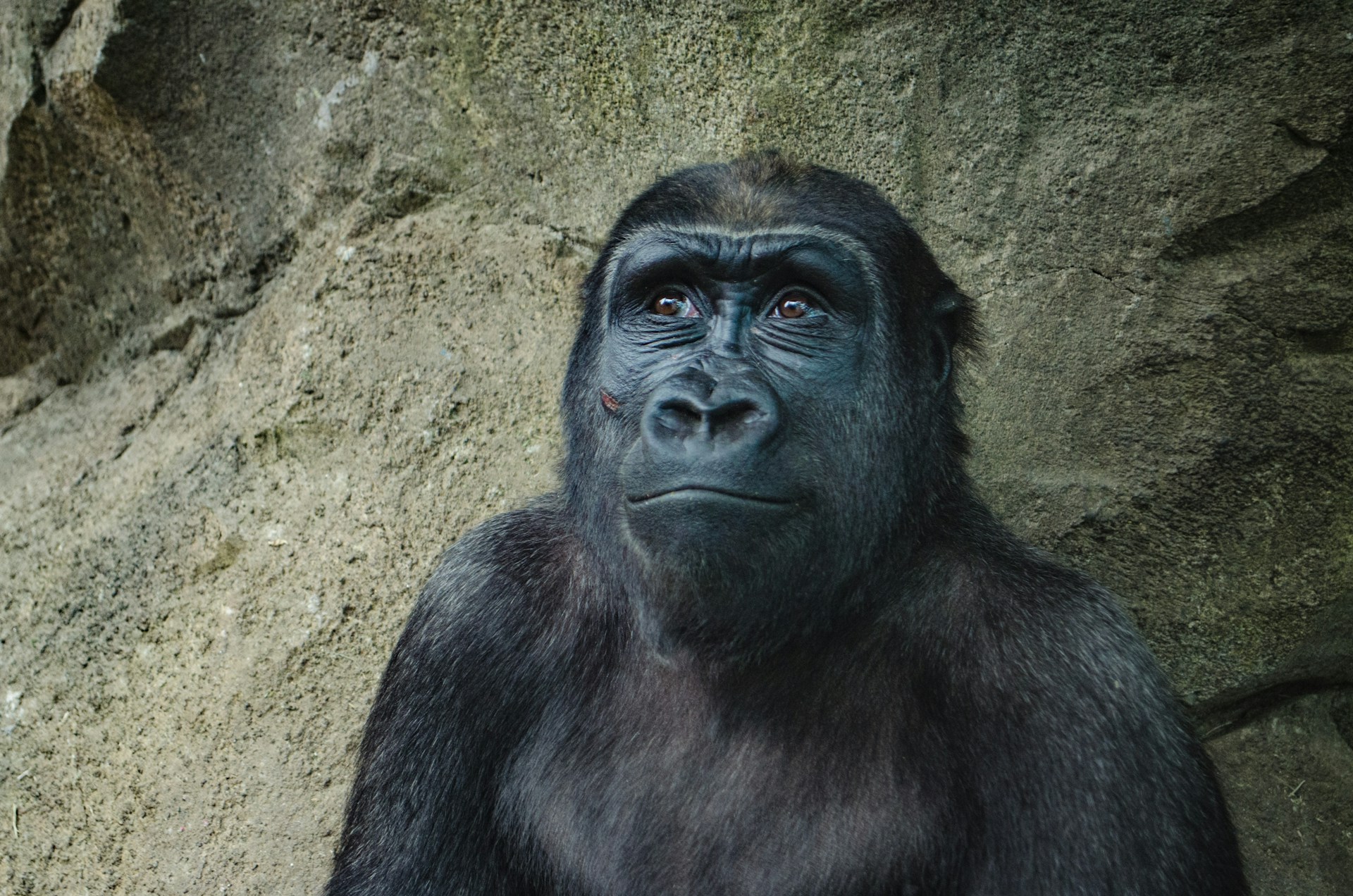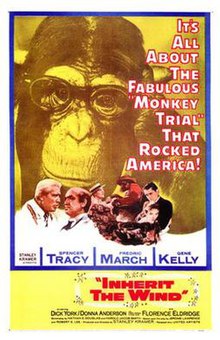
God, Darwin, Philosophers, and Apologists

When man pits God against Darwin
Faith vs Science? Why do we have to choose? What’s really behind this struggle?
I just watched the 1960 film Inherit the Wind, directed by Stanley Kramer and based on a play by Jerome Lawrence and Robert Lee. The story is the fictionalization of the 1925 “Scopes monkey trial” that pitted Darwin’s Theory of Evolution against The Bible.
The final scene is the big payoff for Atheists who love to point out what they believe is one of Christianity’s most significant flaws. However, in that scene near the end, Spencer Tracy, playing the attorney who defended the teacher jailed for teaching evolution to his students, picks up Darwin’s book in one hand and the Bible in the other. He holds them out as though to weigh them, then slaps both books together and slips them into his briefcase.
Rather than a definitive statement for Atheism, I believe the point of that moment is to illustrate that science and faith are not mutually exclusive for those who value both. The idea resonates with many Christians who look to their faith in Jesus Christ for personal guidance yet accept science to explain the external mysteries of nature. And why not?
Contrary to specific conspiracy theories (with a few exceptions here and there), most scientists do not go out of their way to use their work to invalidate faith, be it Abrahamic, Buddhistic, Hinduistic, or shamanistic. This was the case for Charles Darwin, who made substantial scientific contributions toward biological evolutionary theory while still dedicated to his faith. It is true that he later declared himself agnostic, neither affirming nor denying Jesus Christ and remained somewhat ambivalent despite the ideological tumult his name would later represent.
My experience with scientists is chiefly with educators—many Christian or Jewish—who dedicate their lives to teaching at secondary and post-secondary schools. A few I have known were involved in research at post-doctoral levels: climatology, geology, marine biology, sociology, and astronomy. Out of a dozen or scientists/researchers with whom I am acquainted, only one was an avowed Atheist, and passively at that, the man usually never engaged in discussions about faith unless he was engaged and only grudgingly.
However, I have witnessed a thickening of minds among ardent believers I’ve met, mostly Christian. Not only do they cite the “evil intent” of scientists, but they also say weird, reckless things designed to force people to take sides. As weird piles upon weird, a recognizable shape takes form; the argument suddenly makes sense. Christian opposition to science is writ large with the behavior of the Council of Cardinals during the so-called Galileo Affair. In the end, it was less about the heliocentric views promoted by Galileo Galilei and more about the politics of the day. Galileo angered many people before and during the various inquests. People took sides, and there was great intrigue in the court. Ultimately, Galileo suffered home imprisonment and lived to a ripe age of 77. Not at all what one might expect for a man whom the Catholic Church condemned for acts of heresy. About 100 years later, the Italians erected a monument to Galileo within the holy walls of the Basilica de Croce. Then, in 1992, all arguments and accusations were rendered moot with a Papal apology.
My point is not to recrimination against history but to toss up a caution flag for those who may be fooled into believing that they do God’s work by denying science. What if I said that God was the first physicist who created all the laws and mysteries we’re only beginning to understand? What if all our questions about God’s great creation lead to answers far beyond all the scientific theories we have today?
Faulty Dogma and Galileo
Some supporters of science have evolved their ideas into what can only be construed as faulty dogma—often mistaking scientific theory as empirical fact. By the same token (albeit on the opposite side), faithful believers treat popular opinions as religious dogma and sometimes make up their versions along the way. For example, Darwinism and biological evolution theory are not the same. Not all claims of Creationism are biblical (e.g., Young Earth). And, of course, this is just the conflict over the origin of life on Earth. The arguments persist in simple concepts like the speed of light, the universe’s age, the nature of stars and planets, the number of planets in the universe, the possibility of life on other planets, climate change, and so on. Take the one issue of the age of the earth. REAL scientists are finally settling on the current estimate of 4.58 billion years old. It’s still a work of theory, of course. Planets don’t come with “date of formation” labels. Some Christians believe Earth is less than 10,000 years old (or as young as 6,000). They base “young Earth” age theories on various references, none from the Bible. Other than the seven days of Creation itself, all estimates of the age of planet Earth are speculative at best.
Lessons can be learned from the “Galileo Affair.” Science enthusiasts, like the Catholic Church and Galileo’s supporters, like Christians blinded by nonscriptural apologetics, make the same error: they hold greater importance for the politics they chose to express rather than the substance of the discussion. The ensuing rhetoric between these parties has significantly damaged civil and rational debate. Emotion fills all the open spaces. The participants can’t resist the temptation of rolling out serial proofs, most of which are laced with unnecessary vitriol and tiresome contradictions. Nevertheless, rational minds occasionally prevail and circle to the idea that we must view science and faith with an open mind, especially where they appear to come at cross purposes. When they do, we find that the Bible complements many aspects of scientific theory (and vice versa).
For instance, I have found that the description of God’s creation of the universe and the generally accepted theory of the “Big Bang” appear to describe the same event. “Let there be light,” and BOOM, out pops every last grain of matter in the entire universe from a singularity: infinitely small, infinitely dense, and infinitely hot. The image brings out my science geek and my image of the hand of God reaching into the darkness to trigger the first movement of all movements. When I hear physicists describe what came before—the alpha vacua (the original emptiness of space)—and how the one great singularity suddenly unpacked all of the matter of the known universe in a matter of SECONDS, and I hear the words of Genesis 1:
In the beginning, God created the heavens and the earth. 2 The earth was without form and void, and darkness was on the face of the deep. And the Spirit of God was hovering over the face of the waters. 3 Then God said, “Let there be light”; and there was light. 4 And God saw the light, that it was good; and God divided the light from the darkness. 5 God called the light Day, and the darkness He called Night. So the evening and the morning were the first day.
How exciting that science perfectly fits God’s description of creation’s first “day.” It makes me wonder if there are other ways that science verifies Biblical truth. What of Adam? What of Eve? What of the miracles described in both testaments of the Holy Bible?
A Conclusion
I write “a” conclusion because there can be so many from this point. Let’s focus on the issue at hand: are “believers” compelled to invalidate science to validate their faith? Throughout my adult journey into (and out of) faith, I bring the baggage of all the bits and pieces I have collected on scientific discovery. Is the universe more than 15 billion years old? I don’t know. However, it fascinates me that between the spaces and passages of time described in the Holy Bible, the possibility remains that the vastness of God’s creation is far more incredible than Earth itself. Indeed, if Jesus is not from this Earth, where is he now? On another planet somewhere out there, teaching again?
I most certainly agree with other apologists that there is no more need to demonize science than there is to impugn God (or the faith) for things that seem irrational to scientists (or the Atheists who love to poke at believers). And I also agree that preoccupied with what the sciences say about the natural world, many believers miss what God says about His world. Do we need more “objective interpretation” to comprehend matters of our faith?
Perhaps believers ought to be wary of deconstructing everything in the secular world to fit their world view. I ask believers to enter all such conversations with the presumption of humility (that God instructs you) and that you need more than what has been given to you by Christ (Matthew 13:11). I recently read On Looking Into the Abyss, written by G. Himmelfarb, who warns about the danger of intellectualizing and deconstruction of art. I think faith fits in there because what is the appreciation of art than an expression of faith in humanity?
I also read Great Emergence: How Christianity is Changing and Why, by Phyllis Tickle who openly agrees with postmodern constructivism in her faith. Human beings construct knowledge, she notes, hence believers must construct or reconstruct their faith and the church to meet expectations of society. What does God say about the rationalization of faith?
If we use faith to rationalize science, worse yet, rationalize that science must be judged by a reconstructed faith, do we not diminish the reverence of religion? The label “religion” is a derivative from Old Latin, Religare, “to bind,” or religion, “to obligate and revere.” Yet, there are other related root verb combinations like relegate and reflection, to “re-read” or “reconsider.” I’m comfortable with all of these definitions. I believe faith requires that all believers study and hold great appreciation for what binds them to this Great Earth, but also to humanity. Should believers wonder how God looks at those who condemn others who have done nothing but express an acute wonder and an ambition to understand His greatest work?
When I was an ardent believer of the Word, I viewed every scientific discovery and theory as an homage to God. Science, so I thought, was another expression of humanity’s deep appreciation and reverence for Creation. As the well-church might be motivated to proclaim, Grace stands apart from all human imagination, to whit as Galileo replies, “E pur si muove” (and yet it moves).
Photo by Kelly Sikkema on Unsplash
About: Ray Wyman, Jr is a content creator, communications professional, and author with more than 30 years of experience. Visit LinkedIN or Raywyman.com for more information.


